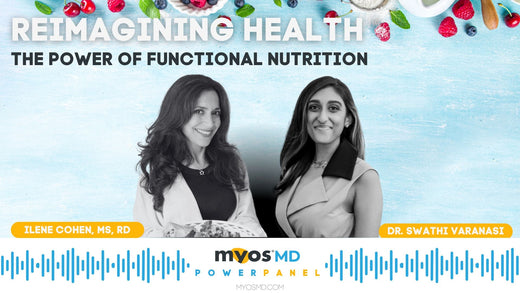Join us in an enlightening discussion with Ilene Cohen, a dietitian who integrates yoga therapy and Ayurvedic practices into her functional nutrition approach. Discover the latest insights on optimal protein intake with our in-depth look at the protein paradox in functional nutrition.
And find out how MYOS MD's revolutionary ingredient, Fortetropin, enhances muscle health and supports increased protein needs, especially for those engaged in strength training and older adults seeking to maintain muscle mass.
Exploring Functional Nutrition and Muscle Health with MYOS MD
About Ilene Cohen
Ilene Cohen is a registered dietitian nutritionist, certified diabetes care and education specialist, yoga therapist, and Ayurvedic practitioner. She combines her diverse expertise to address her clients' health holistically, focusing on functional nutrition—a key aspect of her practice that aims to identify and treat the root causes of diseases.
What is Functional Nutrition?
"Functional nutrition goes beyond treating symptoms to explore the underlying causes of health issues. This approach integrates comprehensive testing to understand how nutrients function at the cellular level," explains Ilene.
It's about more than just the numbers on standard lab tests. We dive deep into how your body uses these nutrients, which is crucial for crafting truly personalized health strategies.
Advanced Diagnostic Tools in Functional Nutrition
Ilene discusses the importance of advanced diagnostics in functional nutrition, including micronutrient testing, food sensitivity assessments, genomic testing, and gastrointestinal tests. These tools allow her to detect imbalances at a microscopic level and tailor interventions accordingly.
Integrating Modern Science and Ancient Wisdom
Ilene's approach exemplifies the integration of Eastern and Western medicinal practices. She emphasizes the importance of combining dietary management, stress reduction techniques, and modern scientific research to achieve optimal health outcomes.
Empowering Patients through Education
Ilene believes strongly in educating her patients to understand their health conditions better and actively engage in their own care. "It's about empowering you to make informed decisions about your health," she states.
Understanding the New Protein Recommendations
In recent discussions, the topic of protein intake has garnered much attention, especially in the context of functional nutrition. The longstanding debate has often circled around how much protein we actually need, especially as our lifestyles and health insights evolve.
As we delve deeper into the protein paradox, it's clear that traditional recommendations may no longer suffice. The old standard of 0.8 grams per kilogram of body weight is being challenged by new studies suggesting that our protein needs are significantly higher, particularly for those who are active or aging.
Functional Nutrition's Perspective on Protein
From a functional nutrition viewpoint, the focus isn't just on meeting minimum protein requirements but on optimizing bodily functions and muscle health. Ilene Cohen, a seasoned functional nutritionist, emphasizes that "we are our patients," highlighting that the nutritional needs of the practitioner and their patients are aligned, advocating for a holistic approach to dietary protein.
How Much Protein Do We Really Need?
According to recent findings, individuals should aim for at least 1 to 1.2 grams of protein per kilogram of body weight. However, for those engaged in strength training or resistance exercises, the need increases to 1.2 to 1.7 grams per kilogram. Ilene notes, "The older we get, the more protein we need," suggesting that seniors may require up to 2 grams per kilogram to maintain muscle mass and support metabolic health.
Adjusting to Individual Needs
In functional nutrition, the emphasis is on personalization and adaptation to individual health needs. As we reassess our protein intake, it becomes imperative to consider factors like physical activity levels, age, and overall health goals. Integrating these insights can help individuals optimize their health through a diet that supports muscle growth and maintenance, ultimately leading to a healthier, more active lifestyle.
A Holistic Approach to Health
The power of a holistic approach to health considers dietary needs, physical exercise, genetic factors, and mental health as all part of the journey towards wellness.

